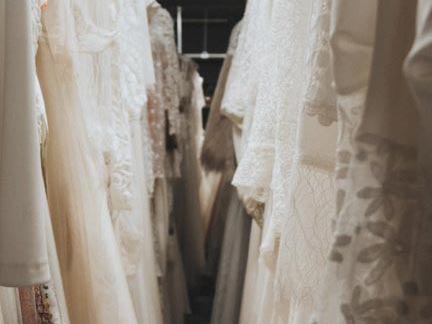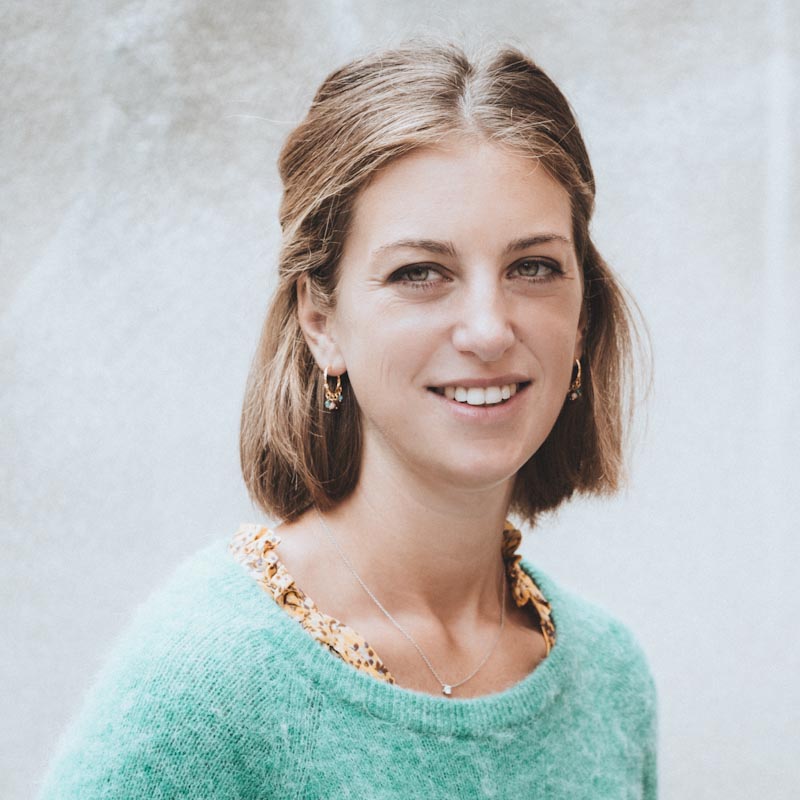Marylise & Rembo Styling (MRFG)
Who is… MRFG?
MRFG stands for Marylise & Rembo Styling Fashion Group, the Belgian family company behind bridal wear brands Marylise and Rembo Styling. The company began as a hat store in 1929, but gradually evolved into the wholesaler of bridal accessories and a small collection of bridal wear that we know today. MRFG specialises in made-to-measure wedding gowns. The dresses of both Marylise and
Rembo Styling are designed in Belgium and, for the most part, made by hand in Portugal. In its head office in Antwerp (where you will look in vain to find even a single plastic bottle), MRFG opts for green energy and eco-friendly lighting, fair-trade coffee and recycled paper. In the longer term, the company wants to get a complete overview of its sustainability efforts throughout the chain.

![]()
Resources
Increase in sustainable materials and gowns
MRFG critically examined all the fabrics it traditionally uses (as well as their suppliers). Building on the results of this research, the company launched a capsule collection with 20 dresses* that are made as sustainably as possible in April 2020. From then on, the share of sustainable gowns will increase with 5% each year. Also on the program is a parallel rise in the percentage of sustainable materials across all the collections.
Fun fact: to constantly remind themselves of the green alternatives available, the team installed an inspiration board at the MRFG studio with samples of sustainable materials!
*14 more than the predefined target of 6 items
![]()
Design
Sustainable design training and recycling (cutting) waste
All MRFG designers are trained in optimal material use and quantities, in order to limit the amount of fabric that goes into the voluminous gowns. The trimmings that do end up on the cutting room floor get a new life as building material. Though this solution is preferable by far to the waste pile, MRFG wants to do better. That’s why the company is eagerly looking for ways to use this cutting waste internally, for instance as yarn. And because even the smallest details matter, MRFG swears by recycled pattern paper.
![]()
Production
Production on demand in own MRFG facility
Contrary to some other bridal wear brands, MRFG makes all of its gowns to measure. This means the production only kicks off when there’s a purchase order. As a result, overstock is never an issue and the amount of production waste remains limited.
94% of the collection is handmade in Europe, by highly skilled Portuguese seamstresses. They work in a modern and eco-friendly building (its roof is dotted by solar panels), a stone’s throw away from the suppliers to keep the chain short. This not only allows MRFG to reduce its ecological impact, but also to safeguard its unique DNA.
MRFG knows exactly who made its dresses – transparency: check – and in which circumstances. Regular factory visits guarantee comfortable working conditions and fair wages (the team is paid more than the minimum wage).
![]()
Retail
Delivery direct to stores and sustainable marketing material
The lion’s share of Marylise & Rembo Styling Fashion Group dresses is delivered from their Portuguese production base directly to the stores. By cutting out intermediaries like a distribution centre in most of the cases, MRFG minimises its logistic footprint.
All MRFG marketing tools, from labels to look books, are made from recycled paper, and since 2019, B2B customers can ask MRFG not to include hangers with their order. The Group attaches importance to honest and transparent communication, giving a sneak peek into the expansion of their Portuguese production facility on its website, or into the preparations for the sustainable capsule collection. The latter will also be in the spotlight at the Barcelona Bridal Fashion Week in April 2020.
![]()
Consumption
Webpage devoted to sustainability
On the MRFG website, an entire page is devoted to sustainability. The Rembo Styling website, in turn, provides readers with background information on for instance the knitwear collection – the brand explains its choice for mohair and introduces Candice, who finishes every knitted item by hand in her studio. MRFG wants to make a habit of this type of communication by launching a blog with sustainability stories. The ultimate goal? Getting customers to care about, and to feel involved in, the sustainability discussion. In addition to this work in progress, MRFG encourages customers to turn their beloved dress into something new, as we’ll explain in more detail in the next paragraph.
![]()
End of life
Inspiring reuse
Finally, MRFG wants to encourage brides to reuse their dress. The team is of course fully aware of the emotional attachment that typically exists between women and their wedding gowns, so making resources of these dresses is not a very likely option. But MRFG is toying with ideas to inspire customers to other types of reuse. Proud owners could transform their dress into a top and skirt, for instance, or a christening dress for their children.

Which lesson(s) do you want to share?
De Vlieger: “The top of the company is highly motivated and takes corporate social responsibility very seriously. This has the huge advantage of allowing us to speed things up: the management makes decisions and swiftly introduces changes. But we also get the rest of the company on board via work groups – a combination that has done wonders for us.”
Chiara De Vlieger (Managing director of MRFG)
What does sustainability mean for you?
Chiara De Vlieger: “For us, sustainability means respecting both people and planet. Step by step, we adapt the way we work to reduce our effect on the environment. In addition, sustainable entrepreneurship
equals local entrepreneurship and short chains.”
What challenges are you currently facing?
De Vlieger: “We are actively looking for sustainable materials, but many of them fail to meet our colour and/or quality standards. This is quite a challenge, and one that we want to address together with our suppliers. We push our current partners at all levels to come up with new solutions and we consistently ask them for sustainable alternatives – from the plastic at the cutting table to the materials of our hang tags. Thus we want to raise awareness with every actor in the chain, growing towards a more sustainable way of working together.”
This page was updated in January 2021. Curious to find out where MRFG stands now? Feel free to get in touch with them via chiara@mrfg.be!